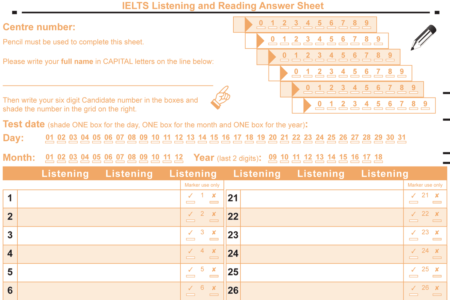
Do you need some helpful listening tips for English proficiency exams? No problem! We have collected some useful advice and ideas for the listening component of official English examinations. This includes recommendations to help you with English exams, including speaking tips, reading tips and writing tips.
What do English listening tests include?
[Last updated on 25/07/2018]
The listening component of an English proficiency exam typically includes four or five sections. There are common topics and the test has different types of questions. Our first tip is the same for the listening test as for the reading test – remember that the answers are given in the actual listening and you don’t need to use other knowledge to complete the questions.
The four main types of listening questions can include:
-
Multiple choice questions
These questions usually give a list possible answers. You need to check how many answers are required (e.g. one or two) and choose from the options.
-
Completing gaps
For these questions, you need to complete a gap with the correct information from the listening. This may include short information such as dates, times, prices etc. The exam paper may also give requirements for the number of words, e.g. complete the gap with NO MORE THAN THREE WORDS AND/OR A NUMBER and so on.
It is important to understand how words are calculated for your exam as well. A hyphenated word (e.g. full-time) is counted as one word, whereas compound words with spaces (e.g. shop assistant) count each word separately.
-
Sentence completion
These types of questions require you accurately complete a sentence with specific information from the listening text. Typically, there will also be a limit on the words or numbers that you can give in the answer (e.g. NO MORE THAN THREE WORDS AND/OR A NUMBER).
-
Matching items
These types of questions usually involve one listening text and four or five questions. You are required to listen to the text and match items given in the questions (e.g. the names of companies) with the options that are given (e.g. the services that they provide).
-
True/False
Listening exams may also include questions that require you to decide whether a statement is TRUE or FALSE based on the information given in the listening text.

What does an English listening test assess?
The listening component of English proficiency exams assesses different types of listening skills, and your knowledge of vocabulary to determine your English level. The questions can target your listening sub-skills, which can include listening:
- for an overall understanding of the main points;
- for a more detailed understanding of specific points
- for key information (e.g. times, places);
- to recognise and understand attitudes and opinions;
- to identify connections between facts in the text and the answers.
Listening tips for English proficiency exams
BEFORE THE EXAM
1. Learn about the different sections and types of questions
We recommend that you learn about the specific English proficiency test that you are going to sit. You can get the most accurate information directly from the examination body’s website (e.g. IELTS, TOEIC, TESOL and the Cambridge English exams and more).
You should know in advance about the length of the exam, the number and types of listening sections and questions. Check if the listening text is played only once or twice, and whether there is time to complete the answer sheet after the listening has finished. This information can help you with your strategy in the exam, and help you to perform better.
2. Read examples of the exam
It is a good idea to read and listen to examples of the listening test in your exam preparation. You can find this information in free materials on the internet and in numerous books. Many listening test samples also come with answers and tape scripts, which enable you to read the texts and find the answers.
3. Practise and develop your listening skills
As with any English exam, you should read, listen and practise with exam preparation resources.
You can also develop your listening skills, by doing things that you enjoy! Some test takers like to listen to music and read the lyrics, you can listen to the news on the radio or the internet, and you can watch television and movies, either with or without subtitles.
4. Develop your English vocabulary
Listening exams also test your knowledge of English vocabulary. The vocabulary used in the listening does not always match the vocabulary used or required in the answers.
For example, you may be given options in multiple choice questions with different words and phrases, which have a similar meaning, to those used in the listening.
Therefore, it is useful to develop your English vocabulary and your knowledge of synonyms to improve your ability to understand English in different contexts. You can also read our ideas of how develop your English vocabulary.

DURING THE EXAM
5. Read questions before the listening starts
You should quickly read the questions before the listening in each section starts. Do you need to choose more than one answer in each task or question? Or, how many words or numbers should you write in the answer?
6. Underline key words
We also recommend underlining key information in the questions, because this can help you understand the questions and identify the answers more easily in the listening text.
7. Think about the context
If you think about the question and identify the topic or context, you can better understand and predict each section of the listening. For example, if you have to give times, dates and prices of a music concert, you can listen more carefully for this type of information.
8. Make notes during the listening and don’t try to understand every word
During the listening, you may hear several answers in a short time. If you try to listen to understand every word, you might miss answers. Therefore, it is better to listen for the main information. You can also make notes directly on the test paper while you are listening. This can be quicker, and give you more time to focus on listening.
9. Write answers on the listening answer sheet
Make sure that you have time to write your answers on the answer sheet. Some exams give a period of time after the listening has finished to do this. Check that you are completing the questions accurately and make sure that your spelling is correct.
10. If you don’t know the answer, guess!
You will only get marks for giving correct answers, and will not lose marks for writing an incorrect answer. In other words, there is no risk in guessing answers that you do not know, so try to complete every question on the answer sheet.
Ideas to improve your English listening skills
Listen, listen, listen and listen some more!
Clearly, this is a listening test and your listening will only get better with practise! As we mentioned before, you can prepare with practice tests, but this should not be the only focus to develop your listening.
Get speaking about different situations
When we were small children, we learned our mother tongue (native language) from listening to others. However, we also developed our language skills by the using the language ourselves. One of the best ways to improve your English skills is to practise using the language. It is natural that speaking and listening are closely linked. Therefore, having conversations in English, especially with native English speakers or qualified English teachers, is a great way to develop your listening and speaking skills.
What now?
You can try our English proficiency test to better understand your English level. It is beneficial to search online for more listening tips for English proficiency exams and examples of the tests. We also have more information about the official English exams that are available and give recommendations for exam preparation materials and English exam courses in Munich.
Good luck!